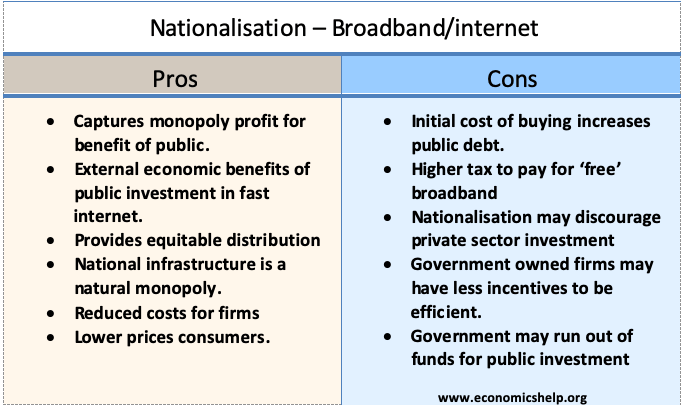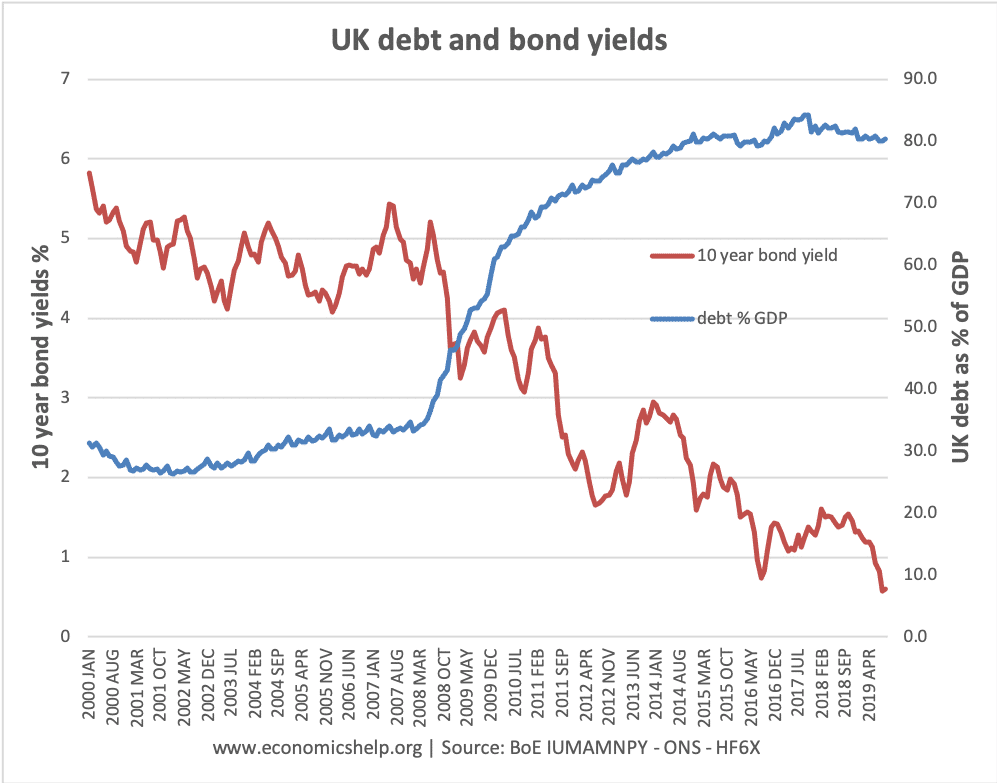The Labour Party has announced a policy to nationalise full-fibre optic broadband provision and offer free broadband to every UK home. It is an ambitious policy which would involve costs of £20-£40bn to purchase Openreach from BT (Labour suggest £20bn, BT, £40. Do the benefits of nationalisation outweigh the costs?

Arguments for nationalisation
External benefits for the economy of broadband provision. Full-fibre optic broadband is an investment which can have significant external benefits. Currently, the UK lags behind other European economies. With only 8% of UK homes having full-fibre broadband, (compared to 71% in Spain). To invest in national fibre-optic broadband would be the 2nd biggest infrastructure project in UK (after HS2) and would cost £35bn. However, once the network is provided it could:
- Reduce costs for business. Business increasingly rely on fast broadband, free provision of faster internet would reduce business costs and help them to be more internationally competitive.
- Enable people to work from home. This would make labour markets more flexible and save time on commuting and reduce pollution.
Low borrowing costs. With UK 10-year bonds at 0.5%, the cost of government borrowing is very low. The return on investing in broadband would outweigh the cost of interest payments on government bonds.
Equity and basic utility. Broadband internet is becoming like gas, electricity and roads. Access to this national infrastructure is a key component of modern life. For example, to apply for universal credit, it is required to apply online. Nationalisation and free access would avoid a digital divide between areas with good provision and poor provision.
National infrastructure is a natural monopoly. A national infrastructure of broadband is a natural monopoly. (the most efficient number of firms in industry is one). Therefore, with a monopoly in a national network, there is scope for a firm to charge higher prices and/or not worry about investing sufficient sums which are in the national interest. In theory, government ownership would be free of the temptation to under-invest for economic reasons and any profit would be captured by public sector.
Captures monopoly profit/Increases consumer surplus. Offering free broadband would reduce business costs and household outgoings enabling higher disposable income (which critics might argue would be used to pay higher taxes for the cost of maintaining annual internet service) The key point about nationalisation is that any profit from provision would be captured by the public sector. At the moment, if companies like Virgin make profit on broadband provision the profit goes to shareholders in Virgin. Under nationalisation consumers with free internet would benefit at the expense of shareholders in internet companies.
- The free element of broadband would require the government to pay the annual maintenance costs. This would be funded from taxation. Labour have suggested a tax on large tech companies like Google and Amazon based on their global profits.
- However, it may not be as easy to tax large tech companies as the Labour Party would hope. High tax may discourage investment from large tech firms and large tech firms have proved adept at avoiding tax burdens.
Arguments against nationalisation
Loss of profit motive. The classic argument against nationalisation is that private companies have a profit motive to be efficient and provide services according to consumer preferences. In the public sector, will the nationalised firm have these same incentives or will it lead to government failure? The nationalised firm may lack incentives to keep a lid on costs and the cost of providing the infrastructure may grow.
Will the government be committed to investment in the long-term? It is easy for a government to promise public sector investment, but in times of financial constraint, public sector investment is often an easier target of cuts than say frontline NHS services. In a few years, a different government may want to prioritise tax cuts or reducing debt and therefore cut the amount available for investing in broadband, and this will lead to delays compared to the private sector, which doesn’t have the same budget and political constraints.
Allocative inefficiency. Offering broadband for free means that the price mechanism is ignored and we provide broadband for free to people who don’t particularly value it. But, although the price is free the marginal cost of providing to some areas is significantly higher.
- The evaluation of this point is that for most people the internet is an important utility and if you have a national network, the marginal cost of providing to everyone is quite low. The biggest segment is the fixed costs of providing the network.
- Also, you could argue the road network is effectively nationalised and free at the point of use. Broadband would be a similar principle.
It will become a political issue. Nationalisation/privatisation is a political ideology. There was a time when British Steel was nationalised and privatised depending on which party was in power. A nationalised Openreach would be a target for privatisation at the next election by opposition parties. This would create uncertainty for other firms in the industry.
Increase in public sector debt. Nationalisation would require more government borrowing, and public sector debt to GDP ratio would increase.

UK debt on right hand side.
- With borrowing costs at record low levels, some economists argue it is not an issue to borrow when the government is gaining assets which will give strong return in the future. But, nevertheless, it would be of some consideration – at least from a political perspective.
No good examples in the world. There are currently few examples of broadband provision being nationalised. Though the French government do own a large share of network and charge private firms to access. The Australian National Broadband Network which started in 2006, is considered a failure – with spiralling costs and delays to implementation. Though the main failure is not so much nationalisation as the ‘multi-technology mix which used a variety of technologies’ and proved ineffective.
Ownership of the internet could affect liberty issues. It is argued that if the government own the internet provision, it would make it easier for the government to regulate content.
- However, I’m not convinced by this argument. You don’t need to own the industry to pass laws to regulate the internet; public ownership wouldn’t make much difference.
Evaluation
In theory, nationalisation of broadband provision means that the public can benefit from economies of scale, equity of provision and capture all the monopoly profits from the important public service. Although it would be very costly to purchase Openreach. With borrowing costs low, the returns to the economy would outweigh the interest costs and
However, you could also ask whether nationalisation will be able to achieve much more than leaving it in the private sector. The roll out of fast broadband will occur if Openreach is left in the private sector. Many fear that government ownership will merely create political uncertainty, greater inefficiency and lead to a shortage of investment funds.
On a personal note, I quite like the idea of public ownership of profitable key public sector utilities. I’m also quite relaxed about government borrowing – knowing how low borrowing costs are. But, I don’t think it is the highest priority in terms of public sector investment because it will happen with or without the government. A higher priority is investment in green technology, flood defenses, public transport and pollution reduction – which will not fully happen in private sector.
Related

I want to know more because i want to nationalize my business